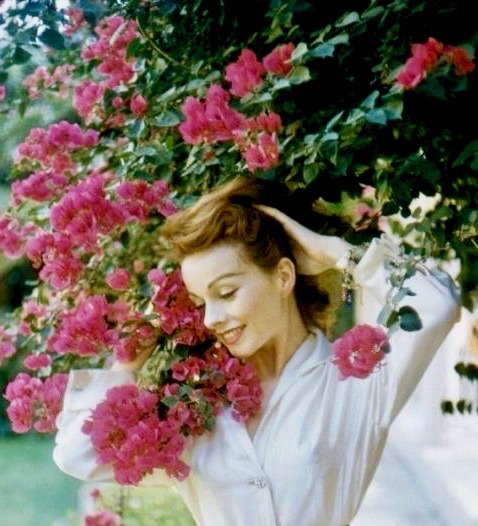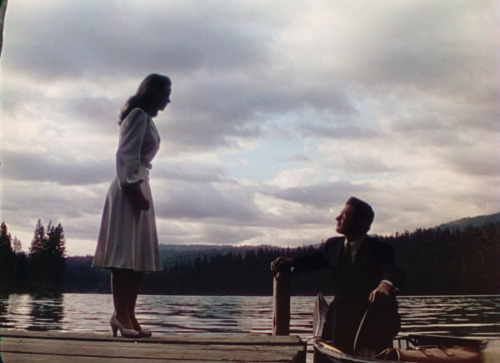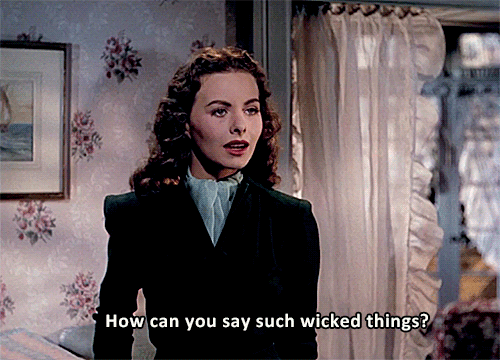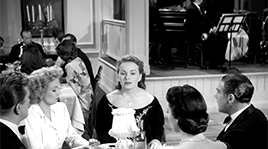Jeanne Crain: the lovely sufferer
Até o final de novembro, Jeanne Crain era apenas um nome e um rosto bonito que eu tinha em mente. A primeira semana de dezembro foi recheada com três filmes dela e, seguindo a lógica, todos os sábados do mês pertenceram a Jeanne no Telecine Cult. Quem escolheu a programação deve ser muito fã da moça. Se isso não for uma enorme coincidência, será uma bela forma de homenagear Jeanne Crain, que nos deixou há 10 anos. Que tal descobrir mais sobre ela?
Until the end of November, Jeanne Crain was only
a name and a pretty face I vaguely knew. The first week of December was full of
her films and, following the pattern, all Saturdays of the month belonged to
Jeanne Crain at the Brazilian TV channel Telecine Cult. Whoever made the
schedule should be a massive fan of hers. If it wasn't an enormous coincidence,
it'll be a beautiful way to pay a tribute to Jeanne Crain, who left us 10 years
ago. How about discovering more about her?
Jeanne Elizabeth Crain nasceu em 25 de maio de
1925. No Ensino Médio teve sua primeira experiência como atriz ao ser convidada
para fazer um teste com Orson Welles. Jeanne não passou, mas decidiu que atuar
seria sua profissão. Aos 18 anos estreou como extra em “Entre a Loura e a
Morena / The Gang’s All Here” (1943) e conseguiu papéis de maior importância
nos anos seguintes. No último dia de 1945, ela se casou com Paul Brooks (nome
artístico de Paul Brinkman, um ator de pequenos papéis) e com ele teve sete
filhos. Jeanne faleceu em 14 de dezembro de 2003, dois meses após a morte do
marido, com quem nem sempre foi feliz.
Jeanne Elizabeth Crain was born on May 25th 1925.
At high school she had her first experience as an actress when she was invited
to a screen test with Orson Welles. Jeanne wasn't chosen, but she decided that
acting would be her profession. At 18 she made her debut as an extra in “The
Gang's All Here” (1943) and in the following year she got juicier roles. On New
Year's Eve 1945, she married Paul Brooks (a bit-part actor whose real name was
Paul Brinkman) and with him she had seven children. Jeanne passed away on
December 14 2003, two months after her husband died – and with him she was not
always happy.
 |
| Na capa da Life, 1945 / On the cover of Life, 1945 |
Em “Amar Foi a Minha Ruína / Leave Her to Heaven”
(1945), Jeanne interpreta Ruth, a irmã de criação da possessiva Ellen (Gene
Tierney), e precisa enfrentar o ódio quando começa a passar tempo demais com o
cunhado, Richard (Cornel Wilde). O filme pertence a Tierney e sua beleza
estupenda e loucura convincente. Mas Jeanne está lá, sofrendo e ganhando nossa
simpatia a cada cena.
In “Leave Her to Heaven” (1945), Jeanne plays
Ruth, the foster sister to possessive Ellen (Gene Tierney), and she has to face
hate when she starts spending too much time with her brother-in-law, Richard
(Cornel Wilde). The film belongs to Tierney, her stupendous beauty and her
convincent role. But Jeanne is there, suffering and receiving our sympathy in
each scene she is in.
Em “Noites de Verão / Centennial Summer” (1946),
filme que eu queria muito ver, Jeanne é Julia, uma moça tímida e inteligente
que se encanta pelo francês Philippe (novamente Cornel Wilde), que está na
Filadélfia organizando uma exposição em comemoração do centenário da
independência americana. Novamente Jeanne deve disputar um homem com a irmã,
mas desta vez é Linda Darnell que interpreta a caprichosa Edith. Edith quer
apenas mostrar sua habilidade para conquistar qualquer homem, uma vez que está
noiva, mas mesmo assim arma uma intriga para ficar com Philippe. Outro
triângulo amoroso no filme é formado pelos veteranos Dorothy Gish, Walter
Brennan e Constance Bennett.
Jeanne finalmente consegue conquistar um homem,
mas tem seu casamento ameaçado em “Quem é o Infiel? / A Letter to Three Wives”
(1949). Ela é Deborah Bishop, a jovem esposa de um militar que acaba de chegar
a uma cidadezinha cheia de fofocas. A moça mais perigosa da cidade é Addie
Ross, que em um piquenique envia a mesma carta a três mulheres avisando que
fugiu da cidade com o marido de uma delas. As outras duas destinatárias da
carta são Lora Mae (de novo Linda Darnell), casada com um homem rude que tirou
ela e a mãe da pobreza, e Rita (Ann Sothern), uma produtora de rádio casada com
o professor de música George (Kirk Douglas), um homem pouco convencional e
muito perspicaz.
Jeanne finally gets a man, but has her marriage
threatened in “A Letter to Three Wives” (1949). She is Deborah Bishop, the
young wife to a military man who just arrived to a little town full of gossips.
The most dangerous lady in town in Addie Ross who, during a picnic, sends the
same letter to three women telling that she ran away with the husband of one of
them. The two other women who receive the letter are Lora Mae (Linda Darnell
again), married to a brute man who took her and her mother out of poverty, and
Rita (Ann Sothern), a radio producer married to music teacher George (Kirk
Douglas), an unconventional and very perceptive man.
No mesmo ano de 1949 Jeanne deixou de sofrer pelo
sexo masculino, mas desempenhou seu melhor papel ainda com sofrimento em “O que
a Carne Herda / Pinky”. A história de Pinky Johnson mostra como o racismo ainda
era presente no pós-Segunda Guerra e deixa a qualquer espectador indignado.
Pinky é uma moça de pele clara, recém-formada em enfermagem, que volta a morar
com a avó negra, Dicey Johnson (Ethel Waters). O preconceito e as tentativas de
violência contra a moça são várias, mas a situação toma outra dimensão quando
ela recebe a herança de Miss Em (Ethel Barrymore), viúva de quem ela cuidou, e
é impedida de desfrutar do que ganhou porque é acusada de ter influenciado na
escrita do testamento. Pinky é hostilizada, mas vai ao tribunal com toda sua
coragem. Esta interpretação fez com que Jeanne fosse indicada ao Oscar de
Melhor Atriz, mas perdeu o prêmio para Olivia de Havilland.
In the same year of 1949, Jeanne stopped
suffering because of the opposite sex, but played her best role still with
suffering in “Pinky”. Pinky Johnson's story shows how racism was still strong
right after the Second World War and it leaves any viewer furious. Pinky is a
fair-skinned girl, who just finished her degree to become a nurse, and she
comes back to live with her black grandmother, Dicey Johnson (Ethel Waters).
The girl suffers prejudice and even violent attacks are attempted, but the
situation changes when she receives an inheritage from Miss Em (Ethel
Barrymore), a widow Pinky took care of. Pinkycan't receive the money because
she is accused of having influenced the old woman to rewrite her will. Pinky
faces hostile people, but she bravely goes to court to reclaim what is hers.
This performance made Jeanne be nominated for the Best Actress Oscar, but she
lost the award to Olivia de Havilland.
Chega 1950 e Jeanne é agora a filha mais velha do
casal Frank e Lillian Gilbreth (Clifton Webb e Myrna Loy) que, em 1920, cuidam
de seus 12 filhos com disciplina em “Papai Batuta / Cheaper by the Dozen”.
Frank quer otimizar o uso do tempo, e para isso faz algumas coisas bizarras,
como uma operação de amídalas em massa. Pouco a pouco seus filhos começam a
contestar o modo de vida imposto pelos pais, em especial Ann, personagem de
Jeanne.
The 1950s arrive and Jeanne is now the oldest
daughter of Frank and Lillian Gilbreth (Clifton Webb and Myrna Loy) who, in
1920, take care of their 12 children with a lot of discipline in “Cheaper by
the Dozen”. Frank wants to optimize their use of time, that's why he does some
odd stuff, like a mass tomsil operation. Little by little their children start
to complain about the lifestyle their parents want, in special Ann, Jeanne's
character.
Resta mais um filme de Jeanne na programação para
eu assistir: “Dizem que é pecado / People will talk”, de 1951, em que ela contracena
com o sempre charmoso Cary Grant. A direção é de Joseph L. Mankiewicz, que dois
anos antes havia se recusado a dar o papel de Eve Harrington em “A Malvada”
para Jeanne, pois a considerava uma atriz limitada. Bem, os vários filmes de
Jeanne Crain estão aí para provar o contrário.





7 comments:
eu vi algum filme com ela, nem com as suas descrições consegui lembrar qual. pena. beijos, pedrita
Não conheço este vou dar uma procurada me pareci muito bom
beijos
bom final de semana
http://pinagirlscris.blogspot.com/
Le - what a lovely tribute to a very lovely, and mostly under-appreciated, actress. She in undeniably pretty and so memorable in both "A Letter to Three Wives" and "State Fair."
Ah yes. Centennial Summer. A great film.
ola querida LÊ,vi muitos filmes da adorável Jeanne Crain,e sempre a achei de uma beleza suave e delicada.Não que fosse uma Grande Atriz mas atuava de acordo com seus personagens.Não sabia que teve 7 filhos e de sua vida particular.Achei ótimo relembrá-la e a seus filmes....Beijo.SU
Sempre adorei filmes antigos e tinha muita curiosidade em saber quem era a atriz Jeanne Crain.Fiquei bastante satisfeita em saciar esse desejo.
casados há quase 60 anos! prestes a comemorarem bodas de diamante! só q faleceram pouco antes disso... lembrar q não foram felizes todos os dias... ninguém é feliz todo dia... brincadeira... parabéns ao casal
Post a Comment